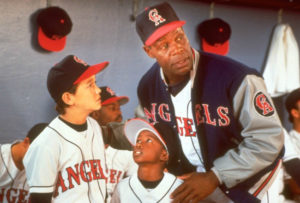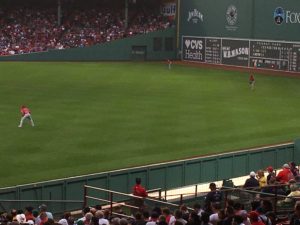1994; 1 h 42 min; PG
Quote:
Photographer: It looks like a prison photo. Would either of you mind smiling? The team did just win.
George Knox: It was a mistake. This team can’t win.
Roger: They won because there were angels out there.

Angels in the Outfield – 1994 /Walt Disney Pictures

Angels in an outfield – 2018 / My camera
I was obsessed with the live-action sports kids’ movies that were so popular in the 1990s, and this genre provided many hours of television for me once they hit the home video market. But on a hot summer afternoon, when you could feel the sun baking the street if you even looked outside and all you wanted to do was hide under an A/C, the best movie to put on was Angels in the Outfield. Not the 1951 original. No, I’m talking prime young-Joseph-Gordon-Levitt, Disney-owned-sports-franchise-tie-in, Christopher-Lloyd-starring 1994 Angels in the Outfield. Back when they were the California Angels and we never imagined they’d be called any different. (The team is currently on its 5th name iteration.)
I assume everyone born in the 80s knows the story of Roger Bowman (Joseph Gordon-Levitt), the young boy in foster care whose father (Dermot Mulroney) says they’ll live together as a family “when the Angels win the pennant.” That night, Roger wishes on a star that the last-place Angels will rise to the top, and the next day he is visited in the park by a real-life angel, Al (Christopher Lloyd), who says they’re here to help. Roger and his best friend J.P. (Milton Davis Jr.) convince the team’s manager, George Knox (Danny Glover), to let them advise him by signaling when a player has an angel with him—the signal is Roger flapping his arms. If you were born between 1980 and 1995 and claim to never have done this, I don’t believe you.
What follows is the typical story of the team coming together to succeed, and I’ve been thinking about it a lot lately. You see, this spring it really felt like the Angels were poised to be THE story of 2018. Why? Well, they were the home of two of the most exciting baseball players in the major league…sort of. And the mixed feelings I had when I went to see them play in Boston earlier this summer might explain why I think the Angels will always be the underdogs in my eyes.
Mike Trout is the best player in baseball. But you have to understand how various baseball stats work to get that conclusion. Saying he leads the league in “wins above replacement” doesn’t mean much to most people but is incredibly impressive if you follow sabremetrics. In a similar fashion, the 1994 remake of Angels in the Outfield is the best kids’ baseball movie because it is the most complicated of its genre. To appreciate how good it is, you need to be old enough to understand the foster-care storyline that drives Roger’s wish for the Angels to win the pennant. Something that seems so cheesy in the trailer is beautifully fleshed out through the whole movie; they don’t even drop its importance once Al and the other angels show up and begin their on-field shenanigans. Joseph Gordon-Levitt, only 13 years old, will break your heart several times over. Brenda Fricker, who plays his foster mom, is fantastic. But all this will go over a lot of people’s heads—I know I certainly wasn’t picking up on how well thought-out, written, and acted all the information about custody and wards of the state was when I watched as a kid.
Shohei Ohtani was drafted by the Angels in December of last year. His switch from the Japanese Nippon Professional Baseball league to America’s Major League was heralded as a grand experiment in two-way players: Ohtani is a record holder for the fastest pitch by a Japanese pitcher AND is famous for his home runs through the roof of the Tokyo Dome. His move to America also made him a steal financially for the Angels. Yet only two months into the season, Ohtani was placed on the disabled list with a sprain in his right elbow. Although he’s since returned to playing, it is only as a hitter and his future as a two-way player up in the air. Similarly, Angels in the Outfield’s failings come from trying to have it both ways. As mentioned above, its strength is the serious story line of the two boys in foster care and how they are swept up in their hope for a family. But, knowing most kids wouldn’t get that, it also dabbles in wacky hi-jinks that… just… aren’t fun once you’re older than nine. I don’t begrudge Christopher Lloyd his role, but other than exposition it’s pointless until his last scene, when he tells the boy that one of the baseball players will be “joining” them soon. Gordon-Levitt’s character even makes him clarify: that means the player is going to die. It is a beautiful moment between them that totally does not fit in the same movie that features a ball being bounced around between invisible angels for what feels like approximately twenty hours while “Hippy Hippy Shake” blasts. On the one hand, it wouldn’t be a Disney movie without the ridiculous physical comedy. On the other hand, if it didn’t have its serious side it would be completely forgettable and not worth revisiting now.
In the end, I think it *is* worth revisiting. If nothing else, watching some great actors (Adrien Brody, Matthew McConaughey, Neal McDonough) play bit parts while looking impossibly young is entertaining. Even Tony Danza, who is billed as a star but really has a supporting role, brings a lovely grounding to his washed-up pitcher. The entire team has great chemistry, which is really the best part of a sports movie, and Danny Glover gives the best table flip of all time. The effects don’t hold up, but then they were never meant to seem realistic anyway and are kept as brief as possible.
Baseball has changed since 1994. The ending is pure schmaltz. And yet, in the same way that watching the Angels and Red Sox play at Fenway Park was the perfect way to spend a warm summer evening, watching Angels in the Outfield is still a good way to spend a hot summer afternoon.
PS – Special thanks to www.fangraphs.com and its Effectively Wild podcast for helping me hone my understanding of Trout and Ohtani.
